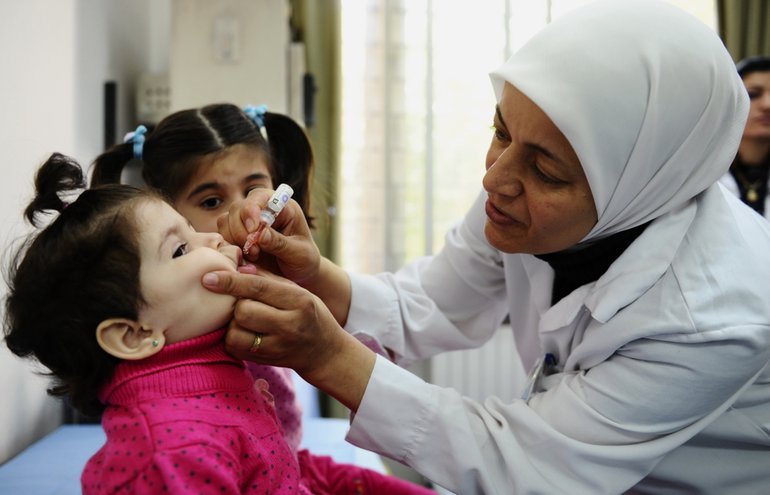Polio outbreak in Syria spurs mass U.N. immunization effort
BEIRUT — An outbreak of polio among children in war-torn Syria has prompted a mass immunization campaign that aims to vaccinate 20 million children in seven Middle Eastern nations and territories, the United Nations and the World Health Organization said Friday.
An emergency drive to prevent the transmission of the crippling ailment and other preventable diseases has already resulted in the vaccination of 650,000 children in Syria, including 116,000 in the northeastern province of Dair Alzour, where the polio outbreak was confirmed a week ago, the international agencies said in a statement.
The outbreak has left 10 children paralyzed and poses a threat to hundreds of thousands across a region that had not seen polio for nearly a decade, the U.N. said. It is the first polio outbreak in 14 years in Syria, where immunization rates have plummeted since the civil war broke out more than two years ago.
The polio cases underscore how the Syrian civil war has spawned an escalating humanitarian crisis, especially in areas outside government control. Hospitals and clinics have been destroyed, medicines looted and trashed, health care workers have fled and sanitary conditions have deteriorated in many areas.
Humanitarian agencies have expressed concern about rising indications of malnutrition in some besieged zones, where food is in short supply. The approach of winter has created a sense of urgency.
“The polio outbreak in Syria is not just a tragedy for children: It is an urgent alarm, and a crucial opportunity to reach all under-immunized children wherever they are,” Peter Crowley, who heads UNICEF’s polio program, said in a statement. “This should serve as a stark reminder to countries and communities that polio anywhere is a threat to children everywhere.”
In the last 12 months, the U.N. said, the polio virus has been detected in sewage samples from Egypt, Israel, the West Bank and Gaza Strip. Preliminary analysis indicated that the virus involved in Syria is of Pakistani origin and is similar to the strain found in the sewage samples elsewhere in the Middle East. How it arrived in the region is not known, experts say.
The polio virus usually infects children in unsanitary conditions via close person-to-person contact and consumption of food and drink contaminated with feces. The virus attacks the nerves and can kill and paralyze, spreading rapidly among children and often goes unnoticed until it begins to cripple its victims, the U.N. said.
Once a global scourge, polio has been eradicated in much of the world and remains endemic only in parts of three countries — Pakistan, Afghanistan and Nigeria — down from 125 nations in 1988, according to the World Health Organization.
columbian


